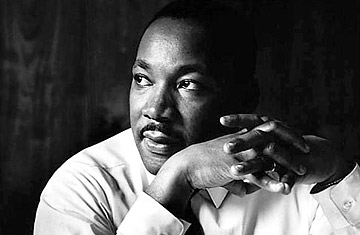
(10 of 11)
Martin Luther King Jr. has already met with President Johnson, and he is similarly optimistic. "I've had a good deal of contact with him in the past several years," says King. "He means business. I think we can expect even more from him than we have had up to now. I have implicit confidence in the man, and unless he betrays his past actions, we will proceed on the basis that we have in the White House a man who is deeply committed to help us." Thus the support of the President for a strong civil rights bill provides a basis for high Negro hopes. Though Negro leaders acknowledge that laws do not change people's hearts, they want the satisfaction of knowing that a federal law supports them in, for example, their demands for equal voting rights and the right to share public accommodations with white men. If the civil rights bill circumvents these specifics, or if it should fail to pass altogether, the leaders are determined to push their revolution all the more strongly in 1964.
The Year Ahead. Some believe that demonstrations may have passed their peak of effectiveness. Says Boston N.A.A.C.P. Leader Tom Atkins: "One of the problems with these damn demonstrations is that you have to keep making them more exciting." But among those who do not agree is Martin Luther King Jr., and his preparations for 1964 are well under way. "More and more," he says, "I have come to feel that our next attack will have to be more than just getting a lunch counter integrated or a department store to take down discriminatory signs. I feel we will have to assault the whole system of segregation in a community."
King's most intensive efforts will be centered on Alabama and Mississippi, "because there the problem is greatest. The Negro suffers more and more. How to deliver an all-out attack? This is what we have to think about. I'm thinking now in terms of thousands and thousands of people. They would have to be students, mainly because, for financial reasons, working adults find it difficult to remain in jail." Very soon King may press an offensive in Danville, Va., which, he says, is "the most difficult immediate situation we face. The town has a notorious record of police brutality. I don't agree that there has to be violence in the future, but this will depend on events. For instance, if a filibuster in Congress stands in the way of meaningful legislation, the Negro could be driven to despair and violence."
King's mission is to turn that potential for violence into successful, direct, nonviolent action, and he works at the job 20 hours a day. He has moved back with his wife and four children to Atlanta, where he shares the pulpit of the Ebenezer Baptist Church with his father. His house, near the church, is an old, two-story, four-bedroom place. Paintings with African themes and a photograph of Gandhi hang on the walls. There is a threadbare scatter rug in the living room, two chairs protected with plastic, and a couch in need of a new slip
